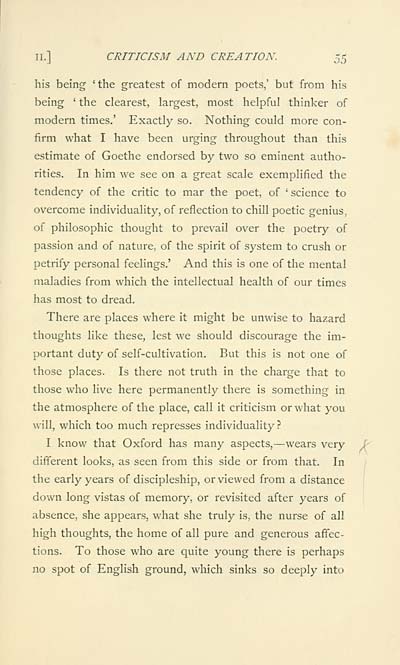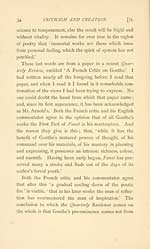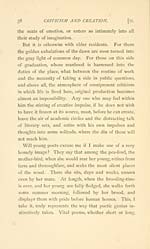Download files
Complete book:
Individual page:
Thumbnail gallery: Grid view | List view

II.] CRITICISM AND CREATION. ^t^
his being 'the greatest of modern poets,' but from his
being ' the clearest, largest, most helpful thinker of
modern times.' Exactly so. Nothing could more con-
firm what I have been urging throughout than this
estimate of Goethe endorsed by two so eminent autho-
rities. In him we see on a great scale exemplified the
tendency of the critic to mar the poet, of 'science to
overcome individuality, of reflection to chill poetic genius,
of philosophic thought to prevail over the poetry of
passion and of nature, of the spirit of system to crush or
petrify personal feelings.' And this is one of the mental
maladies from which the intellectual health of our times
has most to dread.
There are places where it might be unwise to hazard
thoughts like these, lest we should discourage the im-
portant duty of self-cultivation. But this is not one of
those places. Is there not truth in the charge that to
those who live here permanently there is something in
the atmosphere of the place, call it criticism or what you
will, which too much represses individuality ?
I know that Oxford has many aspects, — wears very ^
different looks, as seen from this side or from that. In
the early years of discipleship, or viewed from a distance
down long vistas of memory, or revisited after years of
absence, she appears, what she truly is, the nurse of all
high thoughts, the home of all pure and generous affec-
tions. To those who are quite young there is perhaps
no spot of English ground, which sinks so deeply into
his being 'the greatest of modern poets,' but from his
being ' the clearest, largest, most helpful thinker of
modern times.' Exactly so. Nothing could more con-
firm what I have been urging throughout than this
estimate of Goethe endorsed by two so eminent autho-
rities. In him we see on a great scale exemplified the
tendency of the critic to mar the poet, of 'science to
overcome individuality, of reflection to chill poetic genius,
of philosophic thought to prevail over the poetry of
passion and of nature, of the spirit of system to crush or
petrify personal feelings.' And this is one of the mental
maladies from which the intellectual health of our times
has most to dread.
There are places where it might be unwise to hazard
thoughts like these, lest we should discourage the im-
portant duty of self-cultivation. But this is not one of
those places. Is there not truth in the charge that to
those who live here permanently there is something in
the atmosphere of the place, call it criticism or what you
will, which too much represses individuality ?
I know that Oxford has many aspects, — wears very ^
different looks, as seen from this side or from that. In
the early years of discipleship, or viewed from a distance
down long vistas of memory, or revisited after years of
absence, she appears, what she truly is, the nurse of all
high thoughts, the home of all pure and generous affec-
tions. To those who are quite young there is perhaps
no spot of English ground, which sinks so deeply into
Set display mode to: Large image | Transcription
Images and transcriptions on this page, including medium image downloads, may be used under the Creative Commons Attribution 4.0 International Licence unless otherwise stated. ![]()
| Early Gaelic Book Collections > Ossian Collection > Aspects of poetry > (71) |
|---|
| Permanent URL | https://digital.nls.uk/78386124 |
|---|
| Description | Selected books from the Ossian Collection of 327 volumes, originally assembled by J. Norman Methven of Perth. Different editions and translations of James MacPherson's epic poem 'Ossian', some with a map of the 'Kingdom of Connor'. Also secondary material relating to Ossianic poetry and the Ossian controversy. |
|---|
| Description | Selected items from five 'Special and Named Printed Collections'. Includes books in Gaelic and other Celtic languages, works about the Gaels, their languages, literature, culture and history. |
|---|

